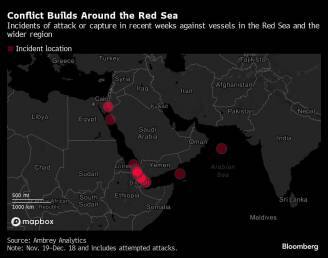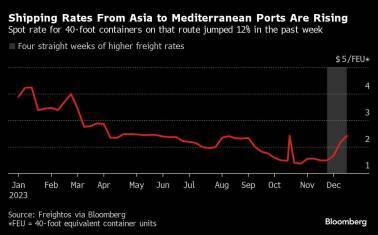



The United States has announced a 10-nation operation to counter the rising threat of Houthi missile and drone attacks targeting ships in the Red Sea.
“Countries that seek to uphold the foundational principle of freedom of navigation must come together to tackle the challenge posed by this non-state actor,” US defense secretary Lloyd Austin said in a statement.
The maritime task force, named Operation Prosperity Guardian, will comprise the United States, the United Kingdom, Bahrain, Canada, France, Italy, The Netherlands, Norway, Seychelles and Spain.
According to Austin, the objective was "ensuring freedom of navigation for all countries and bolstering regional security and prosperity".
Houthi Rebels
The Houthi rebels, backed by Iran, have intensified their assaults on tankers, cargo ships, and other vessels in the Red Sea, jeopardising a major trade route responsible for up to 12 percent of global trade.
These attacks have compelled leading shipping companies and oil giants to avoid the region, diverting global trade away from the vital passage for consumer goods and energy supplies.

Source: Bloomberg
In an expression of solidarity with Gaza, Yemen's Iran-backed Houthi rebels claimed responsibility for attacking two "Israeli-linked" vessels in the Red Sea earlier. These attacks on ships, such as the Norwegian-owned Swan Atlantic and the Houthi-identified MSC Clara, are part of a series of maritime incidents disrupting global trade, aimed at pressuring Israel in its war against Hamas.
Also read | MC Explains: Why Houthi attacks in Red Sea trigger warning for global trade; how it concerns India
Trade disruption
The assaults on commercial vessels by Yemen's Houthi rebels in the Red Sea have deterred major shipping companies and oil corporations, rerouting global trade away from a critical route for consumer goods and energy supplies. This rerouting is anticipated to cause delays and increased prices.
 Source: Bloomberg
Source: Bloomberg
Houthi attacks have contributed to the rise in both oil and European natural gas prices due to market concerns. The Red Sea, Suez Canal, and the narrow waterway separating Yemen from East Africa are crucial passages for container ships and oil tankers, with approximately 10 percent of the world's trade passing through.
With the disruption in the Red Sea, there's a significant impact on the transportation of critical supplies, including energy resources and various goods like palm oil, grain, and manufactured products. While most Christmas store goods are likely delivered, analysts warn of potential delays in online orders.
Also read | Code Red: Red Sea crisis may hobble the global economy
Four of the world's top five container shipping companies have either paused or rerouted movements through the Red Sea, necessitating longer voyages around the Cape of Good Hope at the southern tip of Africa, adding an estimated 10 days or more to the journeys.
These cancellations will pose challenges for economically-strained Egypt, as the substantial fees paid by shipping companies to navigate the Suez Canal constitute a significant revenue stream for a nation grappling with elevated inflation and a depreciating currency.
(with agency inputs)
Discover the latest Business News, Sensex, and Nifty updates. Obtain Personal Finance insights, tax queries, and expert opinions on Moneycontrol or download the Moneycontrol App to stay updated!
Find the best of Al News in one place, specially curated for you every weekend.
Stay on top of the latest tech trends and biggest startup news.